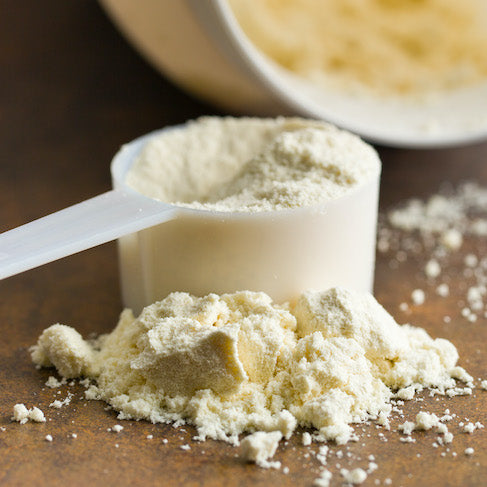Many would like protein powder to be a fairly straightforward topic. I mean... its powdered protein. How complicated can it be?
Very complicated, as it turns out. And because of all these complex little details, many myths and misconceptions have popped up surrounding this common supplement. So, let's take just one of these and examine it closer.
Admittedly, it was difficult to decide which myth was really qualified to be called “the biggest protein powder myth.” Still, we're confident in our choice. And here it is:
All Protein is Created Equal
What's really interesting about this myth – and is probably the reason for its persistence – is that many people don't even realize that they believe it. Still, they do. After all, when people discuss nutrition, they simply talk about protein. This ignores the fact that, on a molecular level, there are literally thousands of different proteins that each had a different biological function. Even if we do step back and do use “protein” as an umbrella-term as is common practice, it ignores the fact that different proteins have vastly different attributes.
Of course, you have the issue of “complete and incomplete” proteins, which most people are aware of. Still many, use these terms incorrectly – largely because they're confusing and misleading. In their correct usage, these classifications refers to whether or not essential amino acids – those that your body cannot produce on its own – are found in the protein. A complete protein contains all the essential amino acids, while an incomplete protein does not.

These terms do not refer to the exact concentration of the amino acids or to the content of the non-essential amino acids. Complete proteins do tend to confer more benefits immediately so everything you need is all in that one package but that doesn't make incomplete proteins useless or even inferior. Your body simply needs essential amino acids over the course of an entire day – meaning that they can be found through a variety of sources.
When dealing with protein powders specifically, you're also likely to encounter the issue of concentrates and isolates – a topic that can hugely influence which protein you select. Concentrates are, basically, the first form that proteins take during the basic processing. In the case of whey and casein, this happens as soon as the milk is treated and the solid casein is separated from the liquid whey. These are the “concentrates.” However, at this point both fats and carbohydrates are still present in fairly significant levels. So, some companies apply further processing to remove these other elements and increase the percentage of protein in the supplement.
Proteins are also absorbed at different rates, which can have a powerful impact on your choice and when you use that specific protein. For example, whey protein is absorbed quickly while casein can literally take hours to be completely put to use.
When designing a diet to complement your workout routine, then, it's important to remember that not all proteins are the same. Not only do various proteins have different roles your body but different protein sources also act in unique ways.
The 5 Biggest Protein Powder Myths
Despite its widespread use and popularity, there are still several fairly persistent myths surrounding protein powder. Let's dive right into the research, then, and see what the science says about some of the biggest protein powder myths out there.
1. You can only absorb 30 grams in one sitting - Decades ago, faulty research assumed that because the average person can only absorb 10g of amino acids per hour and the typical bodybuilder ate every three hours, than the human body absorbs about 30g of protein per hour. There is literally no science to back this up. The truth is that, if you ingest more protein than your body can handle that a given time, it simply waits in your gut until it can be absorbed. There is no magic time limit.
2. Protein powder makes you bulky - It is true that protein is the main ingredient for muscle growth, but it is by no means all that is involved. First of all, your workouts needs to be specifically designed to provide the proper stimulus. Then, your diet needs to contain an excess of calories. Also, hormonal levels – specifically testosterone – play a key role. The point is that protein powder on it's own is not going to turn you into a big, hulking bodybuilding.
3. Protein powder is bad for your kidneys - The kidneys do have to work hard to process protein, that much is true. But, individuals with healthy kidneys will have no difficulty here and, if your diet is balanced, there should be no concern. Even individuals with kidney problems can still take protein powder, they simply have to monitor their protein intake with the help of their doctor.

4. Protein is bad for your liver - Again, there is no evidence that a proper level of protein intake in a healthy person is going to harm the liver. Often, these concerns come from extreme cases, wherein huge amount of protein were taken or the liver was already damaged. Even when taking high-quality protein supplements, it's important to maintain a proper balance of all the necessary nutrients.
5. High protein intake weakens your bones - Because protein is made up of amino acids, which are... acids, some concern has arisen that increasing your protein intake can lessen the integrity of an individual's bone structure. While this does seem to make logical sense, there is no evidence to support the conclusion. In fact, there is some evidence that certain protein powders can even increase bone density. It should also be noted that protein supplements are generally used alongside resistance training which has been proven to greatly increase bone density.






